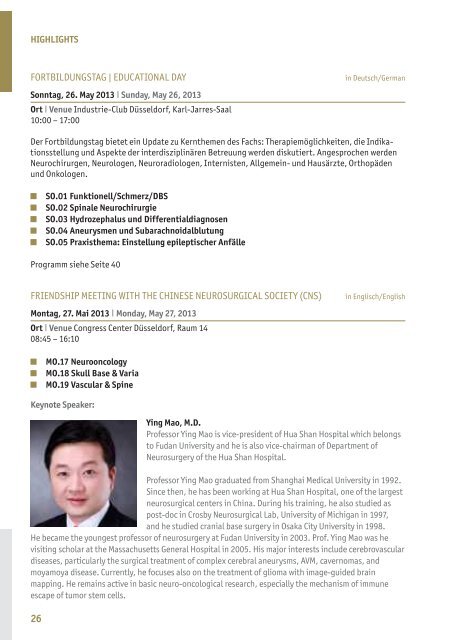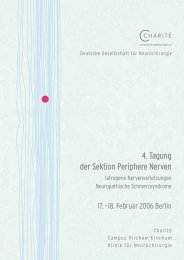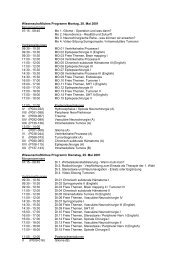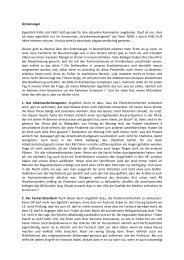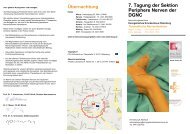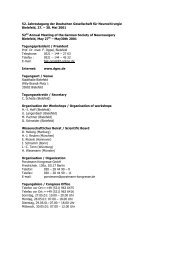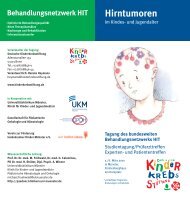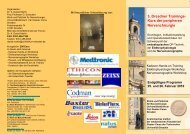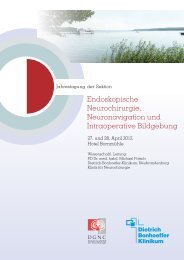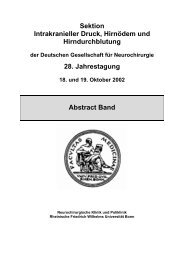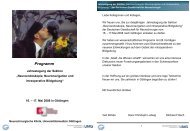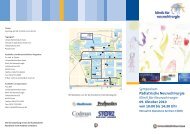Programm final - Deutsche Gesellschaft für Neurochirurgie - DGNC
Programm final - Deutsche Gesellschaft für Neurochirurgie - DGNC
Programm final - Deutsche Gesellschaft für Neurochirurgie - DGNC
Sie wollen auch ein ePaper? Erhöhen Sie die Reichweite Ihrer Titel.
YUMPU macht aus Druck-PDFs automatisch weboptimierte ePaper, die Google liebt.
Highlights<br />
Highlights<br />
Fortbildungstag | Educational Day<br />
Sonntag, 26. May 2013 | Sunday, May 26, 2013<br />
Ort | Venue Industrie-Club Düsseldorf, Karl-Jarres-Saal<br />
10:00 – 17:00<br />
Der Fortbildungstag bietet ein Update zu Kernthemen des Fachs: Therapiemöglichkeiten, die Indikationsstellung<br />
und Aspekte der interdisziplinären Betreuung werden diskutiert. Angesprochen werden<br />
Neurochirurgen, Neurologen, Neuroradiologen, Internisten, Allgemein- und Hausärzte, Orthopäden<br />
und Onkologen.<br />
26<br />
SO.01 Funktionell/Schmerz/DBS<br />
SO.02 Spinale <strong>Neurochirurgie</strong><br />
SO.03 Hydrozephalus und Differentialdiagnosen<br />
SO.04 Aneurysmen und Subarachnoidalblutung<br />
SO.05 Praxisthema: Einstellung epileptischer Anfälle<br />
<strong>Programm</strong> siehe Seite 40<br />
Friendship Meeting with the Chinese Neurosurgical Society (CNS)<br />
Montag, 27. Mai 2013 | Monday, May 27, 2013<br />
Ort | Venue Congress Center Düsseldorf, Raum 14<br />
08:45 – 16:10<br />
MO.17 Neurooncology<br />
MO.18 Skull Base & Varia<br />
MO.19 Vascular & Spine<br />
Keynote Speaker:<br />
in Deutsch/German<br />
in Englisch/English<br />
Ying Mao, M.D.<br />
Professor Ying Mao is vice-president of Hua Shan Hospital which belongs<br />
to Fudan University and he is also vice-chairman of Department of<br />
Neurosurgery of the Hua Shan Hospital.<br />
Professor Ying Mao graduated from Shanghai Medical University in 1992.<br />
Since then, he has been working at Hua Shan Hospital, one of the largest<br />
neurosurgical centers in China. During his training, he also studied as<br />
post-doc in Crosby Neurosurgical Lab, University of Michigan in 1997,<br />
and he studied cranial base surgery in Osaka City University in 1998.<br />
He became the youngest professor of neurosurgery at Fudan University in 2003. Prof. Ying Mao was he<br />
visiting scholar at the Massachusetts General Hospital in 2005. His major interests include cerebrovascular<br />
diseases, particularly the surgical treatment of complex cerebral aneurysms, AVM, cavernomas, and<br />
moyamoya disease. Currently, he focuses also on the treatment of glioma with image-guided brain<br />
mapping. He remains active in basic neuro-oncological research, especially the mechanism of immune<br />
escape of tumor stem cells.<br />
Prof. Ying Mao is also involved in organized neurosurgery in China. He is the current chairman of the<br />
Shanghai Neurosurgical Society. He is also the chairman of the cerebrovascular section of the Chinese Congress<br />
of Neurological Surgeons and the chairman of cerebrovascular section of the Chinese Neurosurgical<br />
Association.<br />
He was awarded by Ministry of Public Health of China in 2009 as “Excellent Youth Doctors” for outstanding<br />
clinician in China, as “Outstanding Scientific and Technological Researcher” by the Chinese Science<br />
Association in 2010 and also as “Top 10 Outstanding Doctor” by Shanghai Municipal Government.<br />
Professor Mao Ying has edited 4 books and is author of more than 60 research articles, which have been<br />
published largely in international journals.<br />
Prof. Bai-Nan Xu, M.D., Ph.D.<br />
Bai-Nan Xu is Professor and Chairman of Department of Neurosurgery of<br />
Chinese PLA Medical School in Beijing. He is graduated 1977 at Chinese<br />
Medical College. Postdoctoral training was obtained from 1981-1985 at<br />
Military Postgraduate Medical School ending with the qualification of<br />
Master of Science in 1984 and Ph.D. in 1985. His main academic interests<br />
include precise and accurate neurosurgery with iMRI and multimodal<br />
navigation, surgery of complex intracranial aneurysms and skull base and<br />
brainstem lesions, i.e. giant acoustic neuromas.<br />
Besides his main professional affiliation as Professor and Chairman of the Department of Neurosurgery at<br />
Chinese PLA General Hospital, Prof. Bai-Nan Xu acts as vice-president and secretary general of the Chinese<br />
Neurosurgical Society, as president of the Chinese PLA Neurosurgical Society and as vice-chairman of the<br />
Chinese Congress of Neurological Surgeons.<br />
Charles Y. Liu, M.D., Ph.D.<br />
Dr. Liu’s family immigrated to the United States when he was 12. He<br />
completed an education in Chemical Engineering and Bioengineering<br />
before he developed an interest in neurological surgery. He completed<br />
his residency training at the University of Southern California Keck<br />
School of Medicine, under the tutelage of Michael L. J. Apuzzo, Steven L.<br />
Giannotta, J. Gordon McComb, and Martin H. Weiss. During his residency,<br />
he was engaged in post-doctoral studies in the Division of Chemistry and<br />
Chemical Engineering at the California Institute of Technology with David<br />
A. Tirrell, developing artificial extracellular matrix proteins designed to<br />
customize the stem cell niche.<br />
Upon completing his residency, he joined the faculty in the Department of Neurological Surgery at USC<br />
as an assistant professor and continued his work as a Visiting Associate in Chemical Engineering on the<br />
faculty at Caltech. At USC, Dr. Liu began to develop a broad experience in neurosurgery. He continues to<br />
be a key member of the USC cerebrovascular surgery program and has a large experience in the surgical<br />
management of adult brain tumors, including anterior cranial base and parasellar tumors. He currently<br />
serves as the Surgical Director of the USC Comprehensive Epilepsy Center, the highest volume surgical<br />
27


